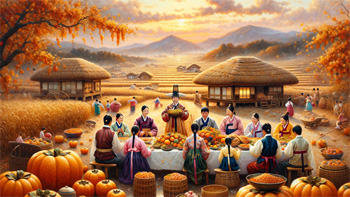 Chuseok : Korean Harvest Festival
Chuseok : Korean Harvest Festival


Chuseok, often referred to as the Korean Harvest Festival, is one of the most important and joyous holidays in South Korea. This festival, celebrated over a three-day period around the Autumn Equinox, is akin to Thanksgiving in the United States. It's a time when Koreans honor their ancestral roots and celebrate the bountiful harvest. Chuseok not only embodies the richness of Korean culture but also brings to life the deep familial bonds and traditions that are central to Korean society. In this exploration, we delve into the origins of Chuseok, its traditional customs, and the contemporary ways in which it is celebrated in South Korea.
The origins of Chuseok can be traced back to Korea's agrarian past, where thanking the gods for a bountiful harvest was a significant annual event. The festival's roots are deeply embedded in both agricultural and ancestral worship practices, reflecting Korea's long-standing connection to its land and forebears.
Traditional Customs and Celebrations
One of the most significant customs of Chuseok is 'Charye', an ancestral memorial ritual. Families prepare a special table with food offerings, including freshly harvested rice, fruits, and traditional Korean dishes. They then perform a ritual to honor their ancestors, a practice reflecting the Confucian value of filial piety and respect for one's lineage.
Another essential aspect of Chuseok is the preparation and sharing of 'songpyeon', a traditional Korean rice cake. These small, half-moon-shaped rice cakes are made with rice flour and filled with various ingredients such as sweetened sesame seeds, beans, or chestnuts. Making songpyeon is a family activity, with members coming together to prepare and enjoy these treats.
Family Reunions and Festive Activities
Chuseok is a time for family reunions. Koreans travel across the country to their ancestral hometowns to spend time with their relatives. It's a period of joyous gatherings, where families share meals, exchange stories, and strengthen their bonds. The importance of family unity and togetherness is at the heart of this festival.
Festive activities during Chuseok include traditional games and dances. 'Ganggangsullae', a traditional Korean circle dance, is performed by women under the bright full moon. Other activities like 'ssireum' (Korean wrestling), folk games, and song and dance performances add to the holiday's lively atmosphere.
Modern Celebrations and Urban Traditions
In modern South Korea, Chuseok retains its traditional essence but has also adapted to contemporary lifestyles. In urban areas, where traveling to ancestral hometowns may not be feasible, families find new ways to celebrate, such as gathering for special meals in cities or enjoying outdoor activities together.
Chuseok also sees special television programs and cultural events that cater to those staying in the cities. These events often showcase traditional Korean music and dance, providing a way for urban dwellers to connect with their cultural heritage.
Chuseok is not just a festival; it's a reflection of South Korea's cultural identity. It underscores the values of gratitude, family, and respect for traditions that are central to Korean society. As South Korea continues to evolve, Chuseok remains a cherished time of the year, bringing together the old and the new in a harmonious celebration of culture, family, and thanksgiving.